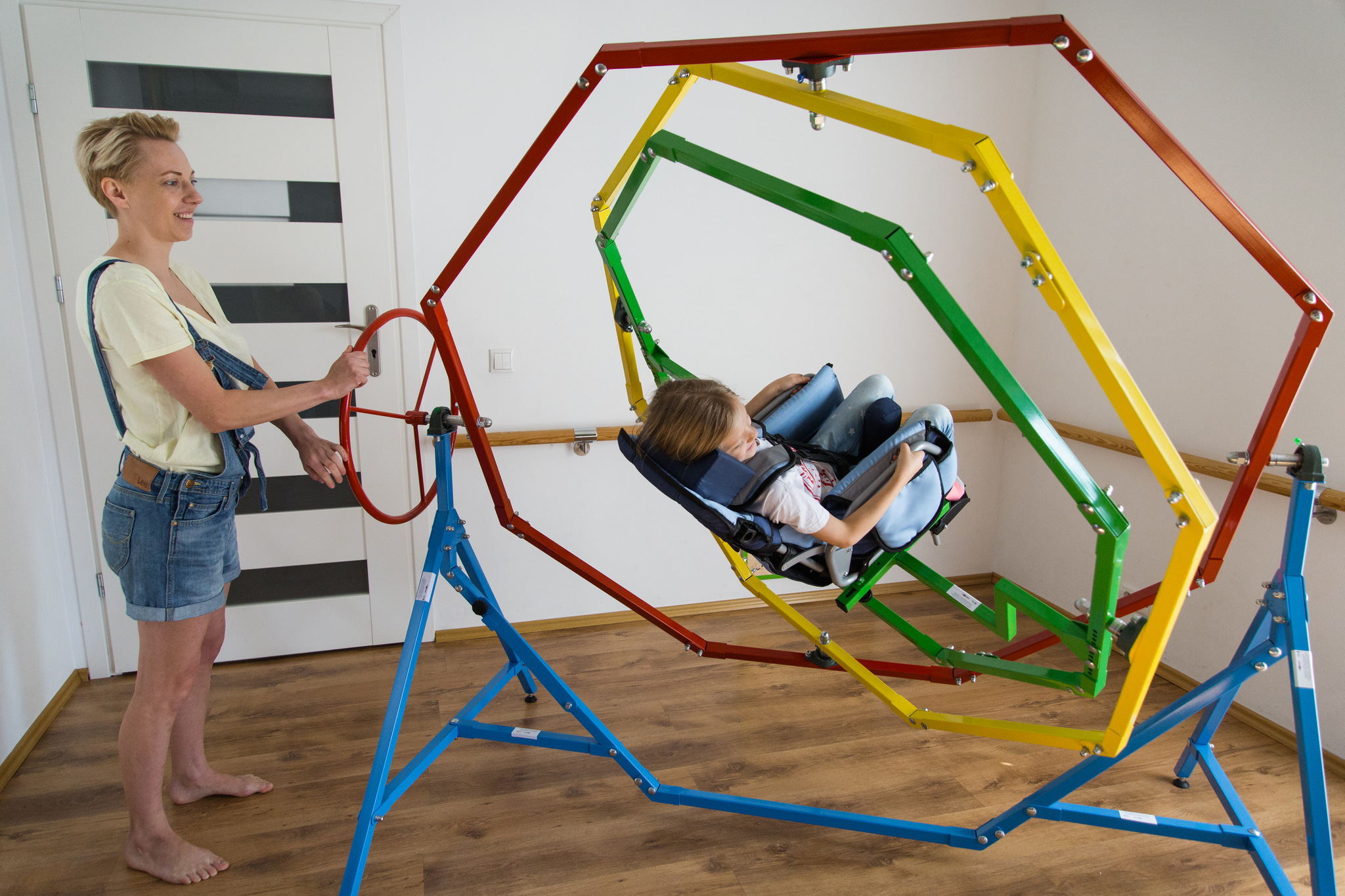Warsaw-based therapeutic centre, UniqueCenter, has created a prototype mobile gyroscope for therapy for children with neurological disorders whose bodily movement and muscle coordination are impaired. It stimulates the vestibular system – the sensory system that enables us to keep our balance – which is essential to treat such disorders. According to experts, the gyroscope has a positive effect on brain’s ability to process the information it needs for us to perform everyday tasks – which is especially helpful for cerebral palsy sufferers.
Polish therapist creates mobile gyroscope to help children with psychomotor disabilities
- 28 October 2020
The mobile gyroscope is designed for children with proprioception and vestibular challenges. Patients with poor muscle tone, retained postural reflexes, poor sense of balance and proprioception challenges can experience multifaceted stimulation in just one session, which is not possible with any other sensory therapy.
The gyroscope is used for psychomotor therapy in a seated position for children over 3 years of age with varying levels of disability, weighing up to 25 kg and up to 140 cm in height. To eliminate safety risks, all moving parts are built into the device. It is compact and easy to transport.
No qualifications are needed to operate the gyroscope, so it can be used in a rehabilitation centre, or at home with parental supervision. As well as exercises, the equipment allows observation of changes during therapy sessions.
Effective support
The UniqueCenter has a dozen therapists who work with disabled children and adults. Over the years, they have developed a therapeutic model based on a holistic view of the child.
The centre’s co-founder Olga Hawryluk has a strong interest in the analysis of brain activity and the central nervous system. She is also the mother of a child with special needs and is keen to help other parents of children with disabilities find effective therapies by sharing her experience of what has worked for her own child, and her research into new developments in the field, with them.
Olga has seen how providing parents with evidence-based information from the start of their child’s rehabilitation accelerates the process. Her interests and personal experience led her to create the mobile gyroscope on the basis of similar existing devices, such as those used by astronauts.
Resembling a colourful swing, the gyroscope is designed for children whose vestibular system does not function correctly. This system is in the inner ear and is used from birth for all kinds of bodily movements that are essential for the development of the nervous system.
A malfunctioning vestibular system can result in serious disturbances in muscle tone, balance or proprioception – the body's ability to perceive its own position in space. Such disturbances can also be related to primitive reflexes – reflexes integrated into our nervous system early in life which, if retained as we get older, adversely affect our capacity to interact with the world.
Better assessment
Use of the gyroscope, combined with recording of brain activity, allow for better assessment of patients’ motor skills. Moreover, a gyroscope covers all three planes of motion: forwards and backwards, side-to-side and twisting. This stimulates the three semicircular canals in the inner ear that are vital for balance.
Children can decide for themselves how far and in which direction to tilt the gyroscope, which gives them a sense of control. It also makes it possible to determine a child's preferences in this regard, thereby aiding diagnosis of gravitational insecurity – excessive fear of ordinary movement, being out of an upright position or having one's feet off the ground – and to gauge the sensitivity of the vestibular system to movement.
Duration of the therapy is determined based on the patient's age and type of disorder. By improving torso stability, head control, reflex integration and proprioception, the process leads to better control of bodily movement on the ground.
Total investment and EU funding
Total investment for the project “Mobile gyroscope as an innovative solution for effective rehabilitation of children with psychomotor disabilities” is EUR 29 274 with the EU’s European Regional Development Fund contributing EUR 20 463 through the “Mazowieckie Voivodeship” Operational Programme for the 2014-2020 programming period. The investment falls under the priority “Research and innovation”.

